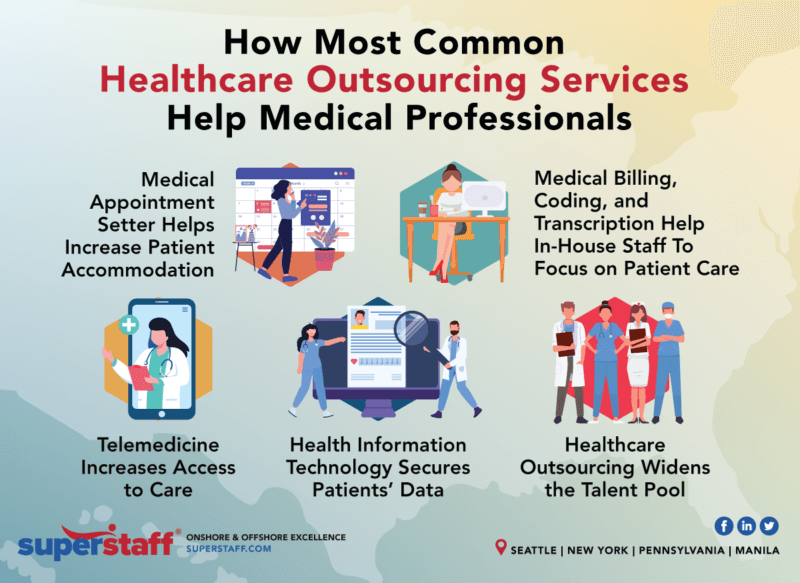
The demand for healthcare outsourcing grew over the years to curb the rising cost of operating health facilities and meet the people’s need for affordable but quality healthcare. Today, healthcare outsourcing became more significant as the healthcare industry fights the pandemic on two fronts: the COVID-19 cases and the crippling labor shortage brought by “The Great Resignation.”
Hospitals Are Facing a Crisis Point as More Healthcare Workers Leave Their Jobs
While demand for medical frontliners continues to increase, healthcare workers are quitting at an alarming rate. The resignations resulted in a labor shortage in the healthcare sector. In effect, the industry experiences higher patient mortality, poor patient care, and financial loss. Here are some statistics painting how the healthcare sector fares at present.
- A survey released in late 2021 showed that 66% of critical care nurses (out of 6,000 respondents) have considered quitting due to COVID.
- A special report published in the same year showed that 1 in 5 health workers had quit their jobs since the pandemic. Thirty-one percent of those who stayed are considering leaving.
- The same report showed that 79% of health workers said that the labor shortage impacted their workplace.
Factors Contributing to Healthcare Labor Shortage
The pandemic brought to light the persisting lack of healthcare workers expected to last until 2030. But other factors in place have also exacerbated the labor shortage in healthcare.
-
Burnout and High Workload
The drawn-out battle against COVID-19 left medical frontliners suffering fatigue and inundated with the deluge of cases. Long before the pandemic, burnout was already a significant issue in healthcare. But the severe shortage in staffing and the continued rise in infections brought the burnout phenomenon to catastrophic levels.
According to a study conducted in 2020, almost half of 21,000 healthcare workers surveyed suffered from burnout, while 38% were dealing with anxiety or depression.
-
Fear of Exposure to COVID-19
Another challenge healthcare workers face is the fear of endangering themselves and their families because of their jobs. Working in healthcare comes with a wide range of occupational hazards, including chemical and drug exposure, injuries, violence, and stress. These risks, however, skyrocketed with the pandemic.
The same 2020 study showed that out of 21,000 healthcare workers, 61% significantly feared exposing themselves and their families to the coronavirus. A different study conducted by the American Association of Critical-Care Nurses in 2021 showed that 92% believed that the pandemic would shorten their careers.
-
Healthcare Reform
Some changes in the US healthcare system made healthcare more accessible. People who previously couldn’t afford medical treatment can now do so. The Affordable Care Act, for instance, helped more people get access to health insurance through Medicaid. As a result, the demand for medical frontliners rose.
-
The Growing Elderly Population
It’s a known fact that the elderly are more susceptible to chronic illness and would, therefore, require more medical care. A study from the Centers for Disease Control and Prevention (CDC) revealed over 85% of people aged 65 and above have one or more chronic conditions.
The baby boomer generation, born between 1946 and 1964, makes up about a fifth of the population in the United States today. By 2029, there will be an estimated 71 million Americans over 65. As their generation ages, the demand for medical services will continue to grow. However, with the existing labor shortage, the healthcare system will find it even harder to meet this demand.
How Healthcare Outsourcing Prevents Work Overload Among Health Professionals
Work overload is a significant cause of burnout among healthcare workers. As more workers quit, the workload of each remaining in-house staff increases. This trend means that as more healthcare workers leave their jobs, even more, would follow due to the same reason–burnout.
Healthcare outsourcing offers several services that can lighten the load for healthcare workers suffering fatigue.
1. Medical Appointment Setter Helps Increase Patient Accommodation
Patient numbers spike during certain seasons. There is always a risk that relying solely on in-house resources would slow down business and affect the medical practice’s patient care.
As an industry that deals with life-and-death situations, time is a critical resource in healthcare. Outsourcing can help businesses by cutting down on turnaround time. It allows in-house staff to spend more time treating their patients. A recent study showed that patients get better care when their doctors have more work hours and longer consultation times.
Health care organizations that focus on maximizing efficiency are more likely to succeed in the long run. Digitizing and streamlining business processes that take up a lot of time would increase efficiency in the workplace and offer patients more convenience.
Healthcare outsourcing companies are always looking for innovations that can enhance the entire healthcare experience for patients. One of these helpful ways is by providing medical appointment setters equipped with the tools, skills, and software necessary to manage incoming patients.
2. Medical Billing, Coding, and Transcription Help In-house Staff To Focus on Patient Care
Every healthcare worker is crucial during both the labor shortage and the pandemic. Typically motivated by a desire to help others, they work countless hours.
The latest data shows that doctors see up to 20 patients per day even before the pandemic. Sadly, medical frontliners are often overworked. A survey published in September 2021 showed that 4 out of 5 doctors say they are already feeling burned out.
Healthcare outsourcing companies allow doctors and other healthcare professionals to spend more time on what they do best–healthcare delivery–instead of being bogged down by administrative tasks. This is particularly helpful for smaller practices where the absence of a single in-house staff could hugely affect essential aspects of the business.
While healthcare workers often wear many hats in their workplace, administrative tasks like medical billing and coding are jobs that require full attention. According to the Medical Billing Advocates of America, 80% of medical bills have errors. Having a team solely dedicated to these tasks is necessary to keep up with the high volume of daily transactions and minimize the risk of errors.
Healthcare BPO companies that provide medical transcription services type medical reports from audio files. Meanwhile, medical billing outsourcing companies automate the billing process with the latest technology. This reduces the risk of errors, speeds up insurance payments, and provides much-needed transparency in the finances of healthcare businesses.
Apart from these, businesses also outsource medical coding services to ensure the accurate documentation of vital patient information such as diagnoses, procedures, and physician’s notes. These alphanumeric codes can help physicians expedite payment and insurance claims.
3. Telemedicine Increases Access to Care
When the pandemic struck, healthcare businesses were compelled to adapt to the new normal. Telemedicine was one of the industry’s means to do so. Amid the lockdowns, it allowed patients and providers to cut down on face-to-face contact during routine visits since it makes use of technology to deliver healthcare services remotely.
Telemedicine made for more accessibility, greater patient mobility, and a wider reach. All it takes is a well-coordinated system that relies heavily on teleconferencing. Due to the time and technical demands, many doctors outsource telemedicine to skilled virtual medical assistants.
For the most part, telemedicine services offer remote consultations through phone and video conferencing. It provides a line of communication between a healthcare business and its patients. It also helps in patient monitoring, especially in the off-chance of an emergency.
Some Types of Telemedicine
- Remote patient monitoring
- Telepsychiatry
- Mobile health communication
Read more: Top 10 Trends Shaping the Future of Telehealth and Telemedicine Post COVID-19

4. Health Information Technology Secures Patients’ Data
No healthcare business can afford not to evolve. A recent study showed that a quarter of all occupations will be automated by 2030. As the healthcare industry becomes increasingly dependent on technology for better scalability, faster speed to market, and improved service quality, the demand for highly-skilled workers also rises. There is a constant need for quick access to patient data.
The data that the healthcare sector handles is susceptible because it deals with the patient’s medical history, billing codes, electronic monitoring systems, or even the treatment of the patient. Managing this much information without technology would be a huge mistake.
Some Healthcare Technologies
- Electronic Health Records
- Hospital Inventory Management,
- Revenue Cycle Management
- Pharmacy Information
- Laboratory Information Systems
- Clinical Decision Support
- Hospital Information System
- E-Prescriptions
5. Healthcare Outsourcing Widens the Talent Pool
Many healthcare outsourcing companies in the Philippines focus on hiring medical professionals such as nurses, pharmacists, and insurance claim analysts. Due to the quality of their work, the demand for Filipino medical workers was already high long before the pandemic.
With the country having the highest medical frontliners working worldwide, particularly in nursing, the demand significantly grew since the outbreak of COVID-19. By choosing a BPO from the Philippines, healthcare businesses will have wider access to skilled Filipino frontliners without the additional cost of flying them overseas.
Ready To Take Your Healthcare Business To the Next Level? Invest in Healthcare Outsourcing
Healthcare outsourcing is an economical alternative to hiring in-house staff that offers opportunities for scalability as your business grows. Superstaff has over a decade of success in providing outsourcing services and business solutions to different industries, including a leading medical manufacturing and biopharmaceutical company. We also have an office in Clark, Pampanga that can help cater to your outsourcing needs.
Contact us today to find out how we can help you outsource your business processes.






